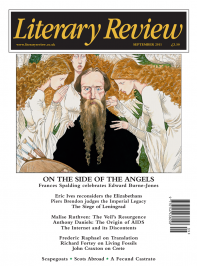Jerry Brotton
The Heirs of Lucretius
The Swerve: How the Renaissance Began
By Stephen Greenblatt
Bodley Head 336pp £20
Throughout the 1980s and 1990s, Stephen Greenblatt wrote a series of dazzling books that changed not just the face of Shakespeare studies, but our entire approach to the European Renaissance. Many students, myself included, chose an academic career in sixteenth-century literature and history because of Greenblatt’s exciting New Historicism, a combination of anthropology, psychoanalysis and post-structuralism that seemed to offer a way out of the arid formalism of prevailing literary criticism, and which provided a new way of understanding the relations between literature and its historical context. Greenblatt wrote of the ‘circulation of social energy’ in Renaissance England, and of how the theatre in particular defined – as much as it reacted to – pressing issues of the time such as political absolutism, colonisation, sexuality, witchcraft and fears surrounding strangers or aliens such as Jews, Turks, and American Indians. Thanks in part to Greenblatt, these issues are now central to the teaching of Shakespeare and his contemporaries.
As well as offering definitive interpretations of key works such as More’s Utopia, Marlowe’s The Jew of Malta, and most of Shakespeare’s greatest plays, Greenblatt’s work stressed two things. First, the self was historically conditioned: the sixteenth century offered a particularly acute moment when writers and public figures

Sign Up to our newsletter
Receive free articles, highlights from the archive, news, details of prizes, and much more.@Lit_Review
Follow Literary Review on Twitter
Twitter Feed
Margaret Atwood has become a cultural weathervane, blamed for predicting dystopia and celebrated for resisting it. Yet her ‘memoir of sorts’ reveals a more complicated, playful figure.
@sophieolive introduces us to a young Peggy.
Sophie Oliver - Ms Fixit’s Characteristics
Sophie Oliver: Ms Fixit’s Characteristics - Book of Lives: A Memoir of Sorts by Margaret Atwood
literaryreview.co.uk
For a writer so ubiquitous, George Orwell remains curiously elusive. His voice is lost, his image scarce; all that survives is the prose, and the interpretations built upon it.
@Dorianlynskey wonders what is to be done.
Dorian Lynskey - Doublethink & Doubt
Dorian Lynskey: Doublethink & Doubt - Orwell: 2+2=5 by Raoul Peck (dir); George Orwell: Life and Legacy by Robert Colls
literaryreview.co.uk
The court of Henry VIII is easy to envision thanks to Hans Holbein the Younger’s portraits: the bearded king, Anne of Cleves in red and gold, Thomas Cromwell demure in black.
Peter Marshall paints a picture of the artist himself.
Peter Marshall - Varnish & Virtue
Peter Marshall: Varnish & Virtue - Holbein: Renaissance Master by Elizabeth Goldring
literaryreview.co.uk